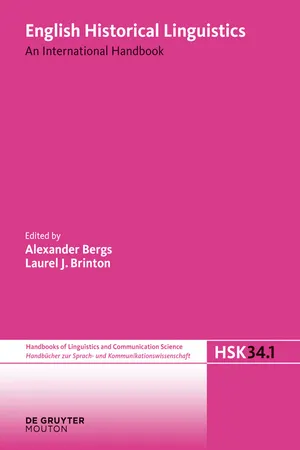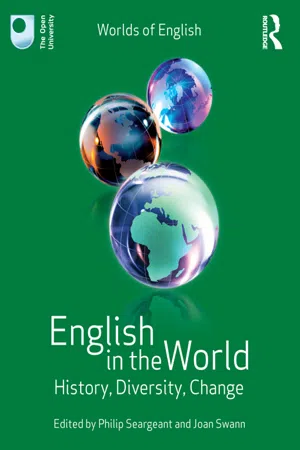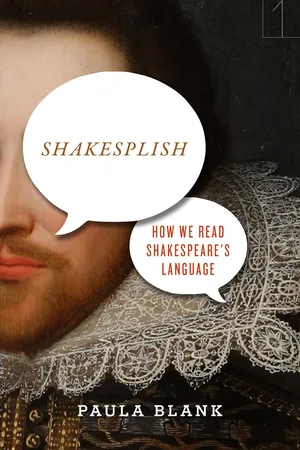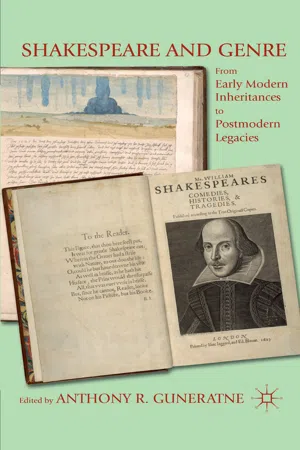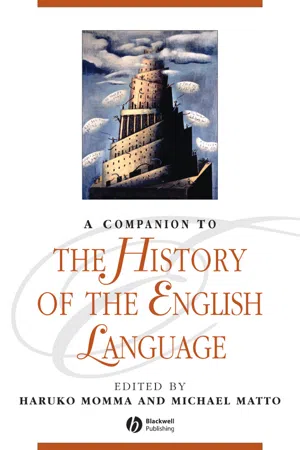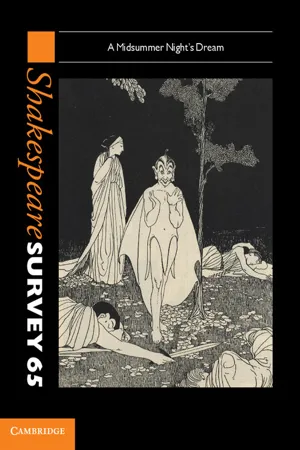Languages & Linguistics
Shakespearean English
Shakespearean English refers to the language used by William Shakespeare in his plays and sonnets during the late 16th and early 17th centuries. It is characterized by its poetic and expressive nature, use of archaic words and phrases, and unique grammar and syntax. Shakespearean English has had a lasting impact on the English language and continues to be studied and admired for its richness and complexity.
Written by Perlego with AI-assistance
Related key terms
1 of 5
7 Key excerpts on "Shakespearean English"
- eBook - PDF
- Alexander Bergs, Laurel J. Brinton, Alexander Bergs, Laurel J. Brinton(Authors)
- 2012(Publication Date)
- De Gruyter Mouton(Publisher)
Those studies that focus on EModE features of the English language or take on a diachronic perspective (including a function-to-form or a form-to-function mapping) also 51 Early Modern English: The language of Shakespeare 821 frequently draw on Shakespeare’s language, because it is a closed set of data. For exam-ple B. Busse (2010) uses the Shakespeare corpus to discover the syntactic realizations of stance adverbials in Shakespeare and to establish their functional import. The informed interplay between linguistics and literary criticism can be seen in Munkelt and B. Busse (2007) and Biewer (2009). Recently there has also been an interest in using a multimodal approach between text and performance (B. Busse 2006a) and film adaptations of Shakespeare’s plays (McInytre 2008). Generally speaking, it can be said that some areas of Shakespeare’s language are still rather unexplored. For example, a syntactic investigation of Shakespeare’s language using modern corpus-based approaches and methodology and leading to a comprehen-sive grammar would be desirable. Also, pragmatic features, such as speech acts, are less well charted, or still unexplored, as, for instance, the investigation of discourse markers or modality in the entire Shakespeare corpus. Those features will hopefully be studied in the Shakespeare corpus by including socio-historical and also cognitive aspects and by relating them to pragmatic considerations. 8 References Abbott, Edwin A. 1966 [ 3 1870]. A Shakespearian Grammar: An Attempt to Illustrate Some of the Differences Between Elizabethan and Modern English . London: Macmillan [Repr. New York: Dover, 1966] Available at http://test.perseus.tufts.edu/hopper/text.jsp?doc=Perseus:text:1999. 03.0080 Adamson, Sylvia. 2001a. The grand style. In: Adamson et al. (eds.), 31–50. Adamson, Sylvia. 2001b. Understanding Shakespeare’s grammar: Studies in small words. - No longer available |Learn more
English in the World
History, Diversity, Change
- Philip Seargeant, Joan Swann, Philip Seargeant, Joan Swann(Authors)
- 2013(Publication Date)
- The Open University(Publisher)
To say that English is the national language of England is not to say that twenty-first century England is monolingual, far from it: at the turn of the millennium, for example, a study reported that London schoolchildren spoke over 300 languages between them (Baker and Eversley, 2000). England also remains a place of great dialectal diversity, as will be explored further in Chapter 5 ; the story of English is as much about changing attitudes towards diversity as it is about actual homogenisation as far as regional spoken dialects are concerned. Finally, the history of English illustrates the inevitability of linguistic change. Although a standard form of written English has been established in England, that standard is always evolving, and as English has spread around the world, several different standard varieties of English now exist. READING A: Shakespeare and the English language Jonathan Hope Specially commissioned for this book. Introduction When Shakespeare’s plays were first printed together, Ben Jonson provided a poem describing Shakespeare as ‘not of an age, but for all time’. Subsequent criticism built on this, constructing what has been called the ‘myth’ of Shakespeare as a cultural phenomenon: a ‘universal’ genius whose qualities transcend history, and who can ‘speak’ to us across time (e.g. Dobson, 1995). The myth of Shakespeare’s universality is powerful but it is also very dangerous, especially in relation to his language. Shakespeare used English at a particular moment in its history: its vocabulary was expanding rapidly while its grammar standardised. He had choices to make about grammatical constructions, pronouns and nouns that are no longer open to us. But Shakespeare’s culture also thought about language differently, and applied different aesthetic values to it - eBook - PDF
Shakesplish
How We Read Shakespeare's Language
- Paula Blank(Author)
- 2018(Publication Date)
- Stanford University Press(Publisher)
Shakespeare wrote in English. As linguists will confirm, Shakespeare’s Early Modern English is phonologically, lexically, and syntactically continuous enough with our own, Modern English that we cannot and do not draw formal language boundaries between them. Yet as teachers of Shakespeare’s texts, and as purveyors of film and theater adaptations of the plays, we know very well that Shakespeare’s language can seem alien to many contemporary readers and audiences, even if our two “Englishes” fail a strictly linguistic criterion of mu-tual unintelligibility. Technically it is the same vernacular, but experientially, 16 Shakespeare in Modern English as I have been suggesting all along, Shakespeare can also seem like a foreign language. There have been calls, of late, to translate Shakespeare into Modern English, not only from desperate students, but from seasoned Shakespeare scholars as well. The very notion that Shakespeare’s Early Modern English needs “transla-tion” suggests the extent to which we have started to treat his works seriously as foreign texts. In 2001, Susan Bassnett wrote a piece that appeared in the British daily, the Independent , titled, “Shakespeare’s in Danger: We Have to Act Now to Avoid a Great Tragedy.” For Bassnett, the “great tragedy” we face isn’t Hamlet or Lear per se but their superannuated language: “The problem with Shakespeare today is linguistic. The language has become obsolete; Shakespeare’s jokes are meaningless; actors and audiences alike struggle to make sense of a language that might as well be Tibetan.” As a result, “boredom and Shakespeare increas-ingly go hand in hand,” she writes, citing the apocryphal story about a for-eign director who pities us as native English speakers, because we have to read Shakespeare in the original. 38 Bassnett argued that only Modern English trans-lations can avert the tragedy of Shakespeare’s otherwise inevitable extinction. - eBook - ePub
- Alexander Bergs, Laurel Brinton, Alexander Bergs, Laurel Brinton(Authors)
- 2017(Publication Date)
- De Gruyter Mouton(Publisher)
Ulrich Busse and Beatrix BusseChapter 17:The language of Shakespeare
Ulrich Busse: Halle/Saale (Germany)Beatrix Busse: Heidelberg (Germany)1Introduction 2General considerations 3Phonology 4Vocabulary 5Grammar 6Pragmatics and discourse 7Recent trends and further directions 8ReferencesAbstract: The present chapter provides a brief outline of Shakespeare’s linguistic contribution to EModE. As a starting point, important reference works and tools for further research are introduced. Then some general considerations on Shakespeare’s language are presented, because Shakespeare’s language, or rather his use of language, can, and in fact has been defined in broader or narrower terms. The description and illustration of Shakespeare’s language begins with a section on pronunciation, then moves on to vocabulary and grammar and ends with pragmatic and sociolinguistic studies and other relatively recent trends. Each section begins by listing basic works on a topic and then presents more detailed or more advanced studies, usually in chronological order. Where necessary, illustrative examples are provided.1Introduction
For the final decades of the Renaissance the works of William Shakespeare (1564–1616) and the King James Bible (the Authorized Version ) of 1611 are the dominating influences: “Dominate, that is, from a linguistic point of view. The question of their literary brilliance and significance is not an issue for this book. Our question is much simpler yet more far-reaching: what was their effect on the language?” (Crystal 1988: 196).Shakespeare’s linguistic quality can be seen on many levels of language. Insightful observations have turned proverbial, one among those is that love is blind . Some Shakespearean words, such as powerfully or obscenely , are still used today, others, such as indirection or incarnadine , are no longer used, but they seem to have a particularly challenging contextual quality. Generally speaking, the number of words Shakespeare invented is impressive (see Section 4 ). His word-stock is equally striking. Depending upon one’s definition of word - eBook - PDF
Shakespeare and Genre
From Early Modern Inheritances to Postmodern Legacies
- A. Guneratne(Author)
- 2012(Publication Date)
- Palgrave Macmillan(Publisher)
It is the sixteenth century that provides the focus for this chapter. Shakespeare lived at a time of great lexical development in English. Research in historical lexicography indicates that about four times as many words came into English between 1500 and 1700 than did between 1200 and 1500. In real (albeit approximate) terms, we are talk- ing about a growth from around 100,000 words in 1500 to 150,000 in David Crystal 20 1600. 3 And many of these new words had to do with language, reflecting the concerns and trends of the day, which included the growth of new literary forms, the movement to standardize orthography, and the long- running “ink-horn” debate over the use of Latin and Greek loanwords. As a brief illustration, here are the dates of the first recorded instances of terms having to do with punctuation, as established by the Oxford English Dictionary. We find punctuation and comma recorded in the 1530s, dash in the 1550s, apostrophe and colon in the 1580s, full stop, period, and point of interrogation in the 1590s, and hyphen and period in the 1600s. While allowing for the inevitable approximation that such dates convey, it is evi- dent that the metalanguage of writing was in the process of formation during Shakespeare’s lifetime. Shakespeare’s Metalanguage Shakespeare’s writing gives us a good sense of the stage of development that metalanguage had reached at the end of the sixteenth century. There are around four hundred metalinguistic items in his plays and poems. The subject of this volume, genre, is not among them; this word did not arrive in English (from French) until well into the eighteenth century. However, it is plain that the notion of “a work characterized by a particular form, style, or purpose” (as the opening OED definition of genre puts it) was well established by Shakespeare’s time. - Haruko Momma, Michael Matto, Haruko Momma, Michael Matto(Authors)
- 2009(Publication Date)
- Wiley-Blackwell(Publisher)
44 Shakespeare’s Literary Language Adam N. McKeown These days, a discussion of “literary language” is almost obliged to begin with some mention of the difficulties modern literary critics have found with the very notion of separating “literature” from other kinds of writing. Happily, we are to some extent disburdened of this obligation when dealing with the English Renaissance. Shake-speare and his contemporaries would have used the term “poetry” to refer not just to verse but also to drama and prose fiction, and they very much viewed poetry as dif-ferent from philosophy, historiography, and many other kinds of writing that might now show up in a literary anthology. The great Elizabethan poet and theorist Philip Sidney explains this distinction very clearly in A Defence of Poetry . Poetry differs from other forms of learned discourse on the grounds that the poet is not just an observer or reporter of reality but a “maker” – a creator of things either better than nature bringeth forth, or, quite anew, forms such as never were in nature, as the heroes, demi-gods, cyclops, chimeras, furies, and such like; so as he goeth hand in hand with nature, not enclosed within the narrow warrant of her gifts, but freely ranging within the zodiac of his own wit. (1971: 23–4) Shakespeare employs very similar language in a description of poetry in his late tragedy Timon of Athens . The Poet, discussing something he wrote in Timon’s honor, says that his imagination – his “free drift” (1.1.45) – is not bound to the particulars of nature “but moves itself / In a wide sea of wax” (1.1.46–7). By “wide sea of wax,” the Poet means that his poetic imagination is limitless, like the sea, and can, like wax, be shaped into anything. For Sidney, the capacity of poetry to soar beyond “the narrow warrant” of nature separates it from historiography, which is bound “not to what should be but to what is, to the particular truth of things” (1971: 32).- eBook - PDF
Shakespeare Survey: Volume 65, A Midsummer Night's Dream
A Midsummer Night's Dream
- Peter Holland(Author)
- 2012(Publication Date)
- Cambridge University Press(Publisher)
4 Almost cer- tainly these figures tell us about the relative cultural importance of these writers in the late nineteenth- century rather than about their contribution to the language. But that is not to say that Shake- speare – and probably some of the other writers too, particularly Milton and Chaucer – have not influenced the language significantly. Given Shake- speare’s unmatched cultural standing, his vocab- ulary and especially his phrases have often been picked up and reused just because they were his: OED3 has recently revised the entry for oneyer, which it suggests means ‘sheriff ’, and has found three twentieth-century examples of the word which allude to Shakespeare’s original use, and there are many other such instances – out-Herod Herod, meaning to outdo Herod in cruelty and evil, for example. 5 OED’s pre-eminence as a record of English vocabulary means that its treatment of Shakespeare has been extraordinarily influential on histories of the language and on studies and editions of Shake- speare’s works. Even when scholars have been able to turn up occasional omissions or errors in the OED – dialect words used by Shakespeare which antedate or postdate OED’s record, for example – such studies have inevitably relied on OED’s unpar- alleled scholarship for the bulk of their analysis, whose validity they are obliged to take on trust. 6 And after the second edition was digitized in the 1990s, and became available in searchable electronic forms (a succession of CDs, with online access to the database 2000–2011), it became much easier to access its data on Shakespeare systematically and to begin to quantify this writer’s recorded contri- bution to the language (according to the OED). The fullest treatment of such electronically acces- sible evidence was Crystal’s analysis of OED2 in The Stories of English.
Index pages curate the most relevant extracts from our library of academic textbooks. They’ve been created using an in-house natural language model (NLM), each adding context and meaning to key research topics.
